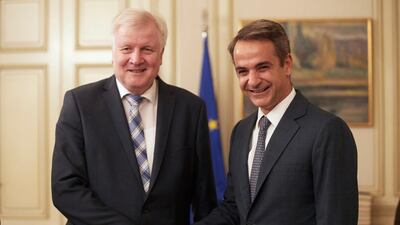Greece's prime minister accused Turkey on Friday of appearing to "exploit" Europe's migrant crisis for its own ends and said Ankara could and should control migrant flows to the continent.
Greece, the route into the European Union for nearly a million refugees and migrants in 2015, is dealing with a new and steep rise in people crossing the Aegean to its islands from neighbouring Turkey after a relative lull over the last three years.
The influx has piled pressure on its hugely overcrowded migrant camps and prompted the new conservative government to announce a stricter policy to curb the flows, which includes tightening its borders and deporting more people.
"I want to be absolutely clear," Greek prime minister Kyriakos Mitsotakis told parliament. "Turkey... must also assume its responsibility.
"It has the ability to control the flows in the Aegean. It cannot give the impression that it is exploiting this issue for its own geopolitical pursuits," he said.
Flows to Greece slowed to a trickle after the EU and Turkey agreed to seal off the Aegean route in 2016, before picking up again in August and September to the highest monthly numbers in the three years since the deal.
Turkey, which hosts 3.6 million Syrian refugees, has threatened to "open the gates" unless Ankara receives adequate international support for a plan to resettle 1 million refugees in northern Syria.
It effectively controls parts of north Syria where it says 350,000 Syrians have returned. Together with the United States it is setting up a "safe zone" in the northeast, where it says many more could be moved.
Under the 2016 pact, Ankara would take back undocumented migrants and refugees, including Syrians, who cross to Greek islands and do not qualify for asylum.
In return, the EU would take in thousands of Syrian refugees directly from Turkey and reward it with more money and other benefits.
More than 78,000 refugees and migrants have arrived in Europe so far this year, more than half of them to Greece, according to United Nations data.
About 40 per cent of recent arrivals are families from Afghanistan and about 20 percent are Syrian.
Mr Mitsotakis said most "have the profile of an economic migrant and not that of a refugee," and he reiterated plans to deport 10,000 rejected asylum seekers by the end of next year.
"This issue is here to stay," he said.
"Europe will constitute a magnet for people from Africa and the Middle East. The phenomenon will continue and is likely to intensify."
Greece has repeatedly called on other EU countries to share the burden of migrant flows.
Moria, on the island of Lesbos, is Europe's biggest migrant camp. It has swelled in just three years to the size of a small town of more than 12,000 - four times its capacity - and has become notorious for its poor and unsafe conditions.
After meeting Germany's interior minister Horst Seehofer in Athens on Friday, Greek citizen protection minister Michalis Chrisohoidis described Moria as "a stain on Europe".
Mr Seehofer said Europe needed to do more to protect its borders and support frontline countries, which also include Spain and Italy, "something we have not yet done sufficiently".
"If we don't help Greece, if we don't help frontline countries, we will end up with a haphazard migration policy that will lead us to a dead-end," he said.

